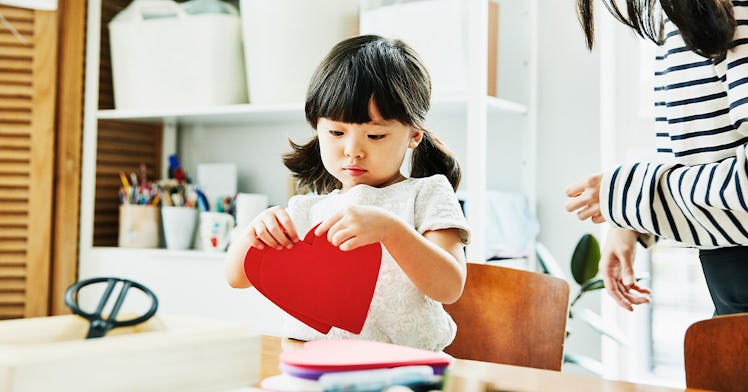5 Great Play and Learning Activities for 4-Year-Olds
These creative geniuses are in their happy place where imaginative play and problem-solving meet.

The world of a 4-year-old is dramatically bigger and more complex than that of a 3-year-old. Their curiosity is boundless, and their capacities — physical, verbal, and logical — to investigate the things and activities that interest them are developing at a rapid clip. It makes sense, then, that the best activities for 4-year-olds, according to Rebecca Parlakian, a senior director of programs at the nonprofit children’s advocacy organization Zero to Three, are the ones that build on their innate “persistence, language, logical thinking, and problem-solving skills.”
For instance, 4-year-olds can learn essential skills like persistence and problem-solving simply by putting together block towers: When a tower falls, a child can learn how to cope with that frustration by pushing through to try another building strategy, and ultimately succeed in getting the block tower to stay standing. Kids this age learn these skills better through play than they do through traditional, learning-focused academic exercises and activities.
Related: The Best Activities for 3-Year-Olds
As much as 4-year-olds learn through play, they also learn through rich, responsive activities and interactions with peers and caregiving adults. “These experiences nurture healthy development across all domains,” adds Parlakian, “including cognitive, social-emotional, communication and physical skills.”
Parlakian maintains that when young children are made to do activities that don’t allow them to play and explore, there’s a developmental mismatch between the setting and the child, which often means the setting fundamentally limits the benefits a child can derive from it. These five activities for home provide the balance of fun, challenge, and interaction that 4-year-olds crave.
Foam Mosaic
Tools Needed: Craft Foam, Glue, Scissors, Cardboard | Optional: Paint, Paint Brushes
Skills Developed: Fine and Gross Motor Skills, Creativity
How to Play: This activity is exciting for 4-year-olds because it ignites their senses and challenges their creativity, while allowing them to build on different areas of development at the same time. Get some colorful craft foam, then show your kid how to cut the pieces (how much do 4-year-olds love scissors?) and glue them to the cardboard. You can take it a step further and have them paint out a backdrop before creating the foam mosaic. They’ll love squeezing on the squishy multi-colored foam, and you’ll love the artistic masterpiece they present you with at the end.
Paper-Weaving
Tools Needed: Scissors, Old Newspaper
Skills Developed: Dexterity, Concentration
How to Play: The paper-weaving activity is a hidden treasure. It targets dexterity and concentration, given the fine placement of paper after paper. It is also a great introduction to sewing and weaving techniques. Take two sheets of paper. Make strips across the first sheet. Take the second and cut along the lines but not completely across. Show your kids how to weave the two sheets together by alternating over and under.
Ice Hunting
Tools Needed: Ice Cube Tray, Water, Toys, Mallet
Skills Developed: Concentration, Analytical Skills, Fine Motor Skills
How to Play: Surprises are fun for babies and adults, but especially 4-year-olds. Get a stash of pint-size toys and freeze them into ice cubes. You can make the activity more fun by using colored liquid. Ask your kids to guess what toys are in the cubes then give your child a mallet and let them break the ice cubes to discover what toys are inside. They will squeal in excitement as each cube reveals a new surprise.
Animal Farm
Tools Needed: Sand, Sandbox, Toy Animals
Skills Developed: Memory Recognition, Gross Motor Skills
How to Play: Sensory play activities like the Animal Farm allow your kids to test and activates their sense of touch, as well as their memory and recognition capacities. Fill up a box with sand then bury toys of different types and sizes in there. Your 4-year-olds should then dig inside the sandbox and try guessing what animals they have touched before bringing them out of the box for a reveal. This activity is also a fun way start teaching you kids about different types of animals.
Organize Cutlery
Tools Needed: Cutlery, Bowl, Cutlery Organizer
Skills Developed: Fine Motor Skills, Gross Motor Skills, Concentration
How to Play: Kitchen organization is gratifying. Your 4-year-old will also enjoy this guilty pleasure. Mix cutleries of different sizes in a bowl and have your 4-year-old sort them into the cutlery drawer. This task, though seemingly simple, helps them build on different areas of development at once: They’re improving on gross motor skills as they grasp the cutlery, dexterity as they organize them into their various slot, as well as focus and concentration as they move through the entire task.